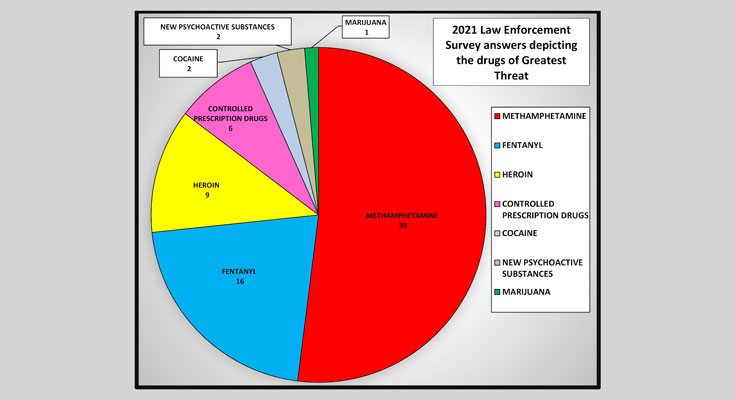By Nicole Allshouse
Homeland Security Investigations in Birmingham have seized more than 10 kilograms of fentanyl so far in 2021.
The opioid problem in the state is nothing new. In 2018, Alabama had 97.5 opioid prescriptions for every 100 persons, according to the National Institute on Drug Abuse. That was the highest prescribing rate in the country.
The CDC reported 944 drug overdose deaths in Alabama in 2020, which was up 31% from 2019. Opioids were responsible for about 70% of the 2020 deaths. Those deaths leave families heartbroken and law enforcement overwhelmed at times.
Doug Gilmer, Resident Agent In Charge with Homeland Security Investigations in Birmingham, said one kilogram of fentanyl can kill 500,000 people. In simple terms: The Department of Homeland Security seized enough fentanyl off Birmingham streets this year alone to kill nearly the entire state population of Alabama, Gilmer said.
And the deadly claws of Fentanyl stretch out beyond drug users.
“Because it only takes such a small amount of fentanyl to be dangerous, it creates a safety concern for law enforcement and first responders who go into places where it has been used as just the residue, if one comes in contact with it, can be enough to create a serious health emergency,” Gilmer said.
According to the Gulf Coast HIDTA (High-Intensity Drug Trafficking Areas Program), “fentanyl has now moved into the number two spot behind methamphetamine as being the drug of greatest threat. Fentanyl has seen an increase as far as deaths go statewide and has overtaken heroin as overdose deaths are concerned.”

Even though 2021 is not over, Jefferson County, the most populous county in Alabama, according to the 2020 U.S. Census data, has broken last year's record of 296 overdose deaths. According to the county coroner's office, overdoses have killed 339 people this year and 85 % of those deaths involve fentanyl.
Birmingham mom, Bonnie Parker, knows the dangers of the drug all too well. She lost her son to an overdose.
"Don't think it can't happen to you," said Parker. "It is absolutely certain death has nothing to do with your family dynamic or upbringing."

Parker said her son was a happy person, proof that even the most positive people can fall victim to fentanyl.
"He's now part of a horrible statistic of this disguised or laced underworld epidemic rather than living all the life and opportunities he still had left to experience," said Parker. "It can happen to all the people, even the people with so much potential."
Parker's son, Taylor, died in 2019, just three days before his 23rd birthday.
"Taylor was so joyful," Parker said. "He was my joy. He wanted every human around him to be happy, and because of that, he carried a lot of the burdens of others along with his own. He was the best friend and wore his heart on his sleeve. He, more than not, told even someone he had just met he loved them and he truly meant it. He loved others sincerely and wholeheartedly. He was magical at cheering other people up and being a listening ear, but it often left him with little to no energy for his own self needs."

Going into 2022, Parker said she still grieves every minute of every day.
"A huge part of my world was taken that day from me," said Parker. "Taylor was my son, an amazing friend, a big brother. He was an aspiring artist and photographer. A kind soul with the most amazing smile that would bring so much joy."
The 22-year-old lived on his own, but he and Bonnie talked daily. They even spoke the night before his death.
"Taylor had a horrible headache, and he had not slept well," Parker said. "After his death, I found out through reading his text messages on his phone he asked an acquaintance for something that would give him a good night's sleep. So, he asked for a Xanax. Hours later, he was dead. What an acquaintance gave him was laced with fentanyl. Taylor went to sleep and never again woke."
According to Gilmer, two milligrams of fentanyl is enough to kill a person.
"That is such a minuscule amount yet a fatal dose," Gilmer said. "It is coming into Alabama from Mexico, often hidden in vehicles, and being added to everything you can think of - meth, heroin, cocaine. We are even seeing it disguised and put in pills to look like aspirin."
Gilmer said a lethal dose of fentanyl looks like a few grains of salt.

According to HIDTA, "The Port of Mobile, which moves around 54 million tons of cargo per year (vessel and railcar) is considered one of the largest in the nation, which makes it a very real option for illegal drugs entering, especially with only a small percentage of the cargo being inspected."
Gilmer said fentanyl is a relatively newer phenomenon within just the past five or 10 years.
"People are mixing it in makeshift labs without any scientific controls like you might find at a pharmaceutical company," said Gilmer. "People don't appreciate the power of fentanyl. It's like morphine but 50-100 times more potent. And since it's odorless and tasteless, it can be mixed with anything, and you would never know. The cartels making the drugs and dealers mixing and selling don't care about precisely measuring portions when they are mixing drugs, and they don't care who dies."
And there are no signs of the drug problem slowing down in the state of Alabama.
"Fentanyl is becoming increasingly more common as it is being added to other drugs in an attempt to make it more powerful and so dealers can demand a higher price," Gilmer said.
Parker said she wants everyone to know the dangers of drugs purchased off the streets.
"It's not worth the risk, the thrill, or the hope for a good night's sleep in my son's case," said Parker. "Don't trust people you think are your buddies - don't ingest any medication unless it's prescribed to you and coming to you from your physician."

Parker hopes to see a change not just in Alabama but in the world.
"No family deserves the pain that this has caused," Parker said. "No young adult deserves not to live a beautiful, adventurous life."
Even after two years, Parker said Taylor's death still doesn't feel real, and that's what makes it harder each day.
"I'm still waiting for him to walk through the door," said Parker. "The emotions of grief versus denial are constantly colliding in my mind. Time does not heal this kind of wound. The thought of eternity and not having to say goodbye again keeps me sane for my other children. Without that, I don't know if I could do it. On days I fall deep into sadness, I peel myself off the ground for my other two boys, who deserve a mom."
Gilmer said fentanyl does not discriminate. Parker is a business owner, loving mother, and Taylor had just decided to look into becoming a Vet Tech while building his photography and design career. They had everything going for them.
Until they didn't.
"I am begging everyone reading this article to have a conversation with their children and loved ones," Parker said. "I would never wish this pain on anyone. Life will forever be bittersweet. You are happy for other people's milestones in life - graduation, getting married, getting their first dream job, and so forth, but you are angry that you will never experience those moments with your own child. It's not fair, but if this story can save one beautiful human, I know that would make Taylor smile his most amazing smile."










